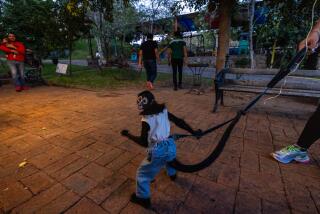Defining moments
Howard Dean screamed. Dan Quayle made a hash of the word “potato.” Jimmy Carter fended off a wild-eyed rabbit.
Like pages in a political scrapbook, those odd episodes endure years, even decades, after the pundits and late-night comics have exhausted their high and low possibilities.
Now, Vice President Dick Cheney and his misbegotten quail hunt seem destined to join that collection of frozen-frame images stored in the nation’s collective memory.
Together, these incidents and others -- such as President George H. W. Bush’s supposed befuddlement at a grocery store scanner -- share certain threads.
They were spontaneous. They were easily comprehensible, unlike, say, the debate over weapons of mass destruction. “Buckshot in someone’s face,” said Bruce Newman, editor of the Journal of Political Marketing. “Story over.”
They offered a glimpse of frailty (which is to say, humanity). And, perhaps above all, they seemed to capture each man in a crystallizing moment.
That, experts and political analysts say, explains why in a world of ceaseless information there are certain events that seize the popular imagination and, over time, prove indelible.
“What they do is bring all the abstractions together into one concrete image,” said Anthony Pratkanis, a psychology professor at UC Santa Cruz and editor of a new scientific journal, Social Influence. In Cheney’s case, he said, “it’s very much like how they’ve handled the statements on Iraq. Have they been shooting straight with the American people?”
He laughed. “Maybe I shouldn’t use that metaphor.”
Still, it is the ability to draw larger meaning from a single moment that makes events such as Cheney’s hunting mishap stand out, Pratkanis and others said.
Dean, the fallen Democratic presidential front-runner, underscored doubts about his steadiness when he loosed a primordial shriek after finishing third in the Iowa caucuses. (Not that it hurt him irretrievably; he’s now party chairman.) Former Vice President Quayle reinforced doubts about his intellect when he misspelled the word “potato” in front of a grammar school audience.
For Carter, a bizarre drama in the spring of 1979 came to symbolize what many considered the haplessness of his administration. The president was on a fishing trip in Plains, Ga., when he was forced to shoo away a swamp rabbit that approached his small boat making hissing noises and gnashing its teeth. The “killer rabbit” made the evening news and the front page of the Washington Post -- and has since resurfaced in coverage of the Cheney incident.
Unlike those episodes, the veracity of the tale of President George H.W. Bush and a supermarket scanner is a subject of dispute. The president was at a National Grocers Assn. convention in Orlando when, according to a New York Times account, he marveled as a quart of milk, a light bulb and a bag of candy were run through a checkout stand -- a bit of everyday technology he presumably had never encountered inside the political bubble. Other witnesses reject that telling, but no matter: The notion of an elitist, out-of-touch president helped Bill Clinton defeat Bush a few months later.
What each event seemed to capture, fairly or not, were some of the most derided attributes of each individual. The fact that they occurred at a time of political weakness was no accident. Indeed, it made them all the more resonant.
Anytime the vice president of the United States shoots someone -- the last time it happened was more than 200 years ago -- it is sure to be a huge story. Still, it would not have been as big a deal “if the administration wasn’t down in the polls,” said Kathleen Hall Jamieson, a political communications expert at the University of Pennsylvania.
Critics of Bush and the vice president “were searching for a metaphor” that would reflect their discontent, she said. “It’s standing in for not having to follow the rules. It stands in for incompetence. It stands in for arrogance. It stands in for failing to release information in a timely fashion.”
Both friends and detractors of the administration say the famously secretive Cheney turned the incident into a much bigger problem by withholding information and waiting days before publicly making amends. Even then, he seemed to do so under duress. (Any political damage, however, has to be weighed against the fact that neither Cheney nor the current President Bush expects to face voters again.)
“The incident would have blown over relatively quickly if they’d addressed it within hours after it occurred: ‘Here’s what happened. Here’s why it happened,’ ” said Chris Lehane, a Democratic communications strategist who offers crisis counseling to private businesses. “Get some credibility and trust points for putting it out on your own terms. Failing to disclose only reinforced one of the views people have of this administration, which is not being straight and being secretive.”
The story briefly took a troubling turn when the victim, Texas lawyer Harry Whittington, suffered a heart attack days after the shooting. But with doctors promising a full recovery, the public was freed to return to a more sporting pursuit: the pleasure of watching the mighty humbled.
“These people’s careers are so skillfully sculpted and so laboriously prepped that when something goes wrong, there’s a kind of public satisfaction in seeing that someone so high and famous can fall so flat,” said Ross K. Baker, a Rutgers University political scientist.
Now that Whittington has left the hospital, the story will fade from TV and the newspapers, and, Baker suggested, the victim will soon be a mere “footnote” in history.
It is Cheney and his stray shot that have gained immortality.
More to Read
Start your day right
Sign up for Essential California for news, features and recommendations from the L.A. Times and beyond in your inbox six days a week.
You may occasionally receive promotional content from the Los Angeles Times.







